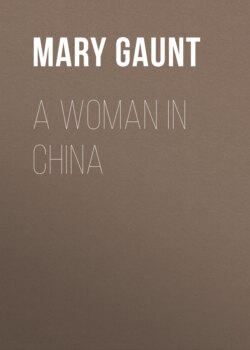Читать книгу A Woman In China - Mary Gaunt - Страница 6
На сайте Литреса книга снята с продажи.
CHAPTER II—A CITY OF THE AGES
ОглавлениеTable of Contents
Chien Men Railway Station—Driver Chow—“Urgent speed in high disdain”—Peking dust storm—Joys of a bath—The glories of Peking—The Imperial City—The Forbidden City—Memorial arches—The observatory—The little Tartar princess—Life in the streets—Street stalls—A mercenary marriage—Courtly gentlemen.
I looked out of the carriage window as the train ran through the Chinese city on its way to the Chien Men railway station, and wondered what the future was going to be like, and I wondered aloud.
“How will I get on?”
Opposite me sat an amusing young gentleman with a ready tongue.
“Oh you'll be all right,” said he. “The Chinese 'll like you because you're fat and o——” and then he checked himself seeing, I suppose, the dawning wrath in my eyes. The Chinese admire fat people and they respect the old, but I had not been accustomed to looking upon myself as old yet, though I had certainly seen more years than he had, and as for fat—well I had fondly hoped my friends looked upon it as a pleasing plumpness. With these chastening remarks sinking into my soul, we rolled into the railway station.
The railways in China, with a few exceptions, have been built by the English or French—mostly by the English—and are managed to a great extent on European lines, so that arriving at the railway station in Peking does not differ very much from arriving at any other great terminus, save for the absence of cabs; but I imagine there must be differences, and that those who run the lines have little difficulties to contend with that would not occur on the London and North Western for example.
“Dear Sir,”—wrote a stationmaster once to the locomotive superintendent—“I have, with many tears, to call your attention to your driver, Chow, who holds urgent speed in high disdain.”
The locomotive superintendent, without any tears, investigated the charge against this driver, Chow. The line was worked on the staff system. No driver could leave a station without giving up the staff he had brought in, and receiving the corresponding one for the next stretch of line. The staff—to follow the directions—is to be handed to the driver by the stationmaster, but the stationmaster on this, and I expect on many other occasions, for the Chinese are past-masters in the art of delegating work to someone else, had handed the staff to a coolie and gone about his pleasure. Now Chow evidently had a grudge against him, for, I fear me, no one believed in his altruism. He insisted on the strict letter of the law and declined to take the staff until it was handed to him by the important man himself, and he kept the whole train waiting, while that worthy was searched for, and hauled out of the particular gambling-house he most affected. When the gentleman appeared, furious and angry, on the platform, Chow calmly lifted up his staff to effect an exchange, and he swore on investigation he had forgotten that the end the stationmaster received had been reposing for all the long wait upon the nearly red-hot boiler! That the stationmaster burnt his fingers is a mild statement of the case.
There was a wild wind blowing when I stepped out of the train and looked around me at the frowning walls, at least I looked as much as I could, for the day was bitterly cold, and most of the ground was in the air. A London fog was nothing to it, that is soft and still and filthy, this was hard and gritty, moving fast and equally filthy, and every one of the passengers was desperately anxious to exchange the bleak railway station for the warmth and comfort and cleanliness to be found between four walls.
I was just as anxious as anybody else, but by the time I had collected my luggage the awful facts were borne in on me that all the people with whom I had made friends on the way across, were rapidly departing, and that there was no one to meet me. Peking was wonderful, I knew it was wonderful; there were such walls as I had never even dreamt of, towering above me, but I was not able to rise above the fact that I was in a strange city, among quaint-looking people who spoke an unknown tongue, and that I did not know where to go. And the Morrisons' invitation had been most cordial. I had rejected all offers of help, because I was so sure someone from their house would be there to meet me, now I seized the last remaining passenger who could speak a little Chinese, and, with his help, got a hand-cart for my gear, drawn by two ragged men, and a rickshaw for myself—this man haulage, this cheapness of human labour, made me realise more quickly than anything else could have done, that I had really arrived in the Eastern world—and after a little debate with myself I started for Dr Morrison's. I had been asked to stay there, and I felt it would be rude to go to the hotel, but as we drove through the streets I thought—as much as the dust, the filthy dust—that the violent gusts of wind were blowing in my face would allow—not of the wonders of this new world upon which I was entering, but of how I should announce myself to these people who apparently were not expecting me. I had such a lot of luggage too!
